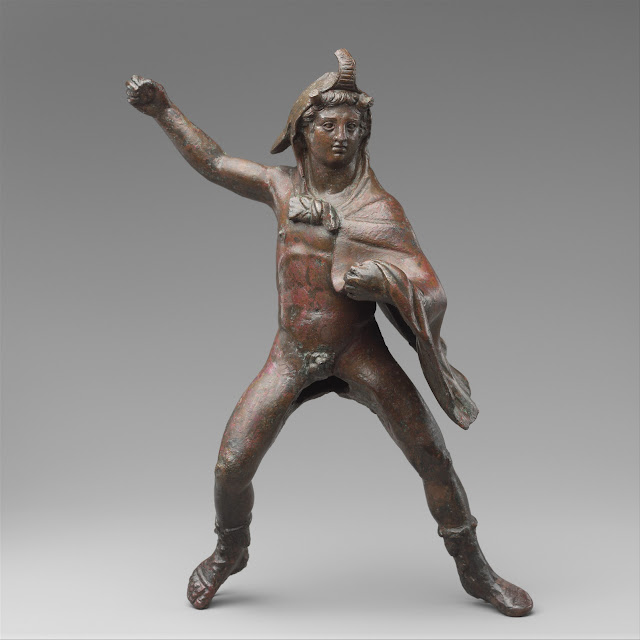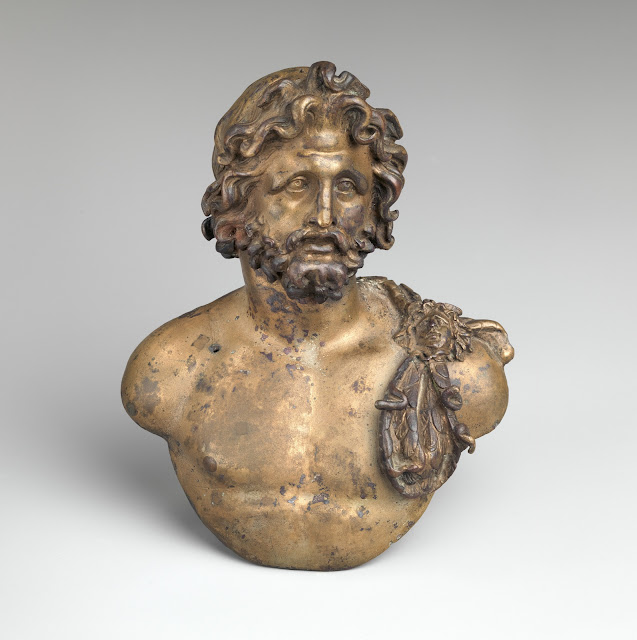 |
| Ancient Greece Rider wearing an elephant skin 3rd century BC bronze statuette Metropolitan Museum of Art, New York |
 |
| Ancient Greece Male Figure (fragment) ca. 475 BC bronze statuette Metropolitan Museum of Art, New York |
 |
| Ancient Greece Cuirass 4th century BC bronze Metropolitan Museum of Art, New York |
 |
| Ancient Greece Torso of Youth ca. 500-450 BC bronze statuette Metropolitan Museum of Art, New York |
As other men, so I myself do muse
Why in this sort I wrest invention so,
And why these giddy metaphors I use,
Leaving the path the greater part do go.
I will resolve you: I am lunatic,
And ever this in madmen you shall find,
What they last thought of when the brain grew sick
In most distraction they keep that in mind.
Thus talking idly in this Bedlam fit,
Reason and I (you must conceive) are twain.
'Tis nine years now since first I lost my wit;
Bear with me then, though troubled be my brain.
With diet and correction men distraught
(Not too far past) may to their wits be brought.
– Michael Drayton (1563-1631)
 |
| Ancient Greece Athlete completing jump ca. 450 BC bronze statuette Metropolitan Museum of Art, New York |
 |
| Ancient Greece Athlete expressing veneration ca. 480 BC bronze statuette Metropolitan Museum of Art, New York |
 |
| Ancient Greece Victorious Youth ca. 300-100 BC bronze statue Getty Museum, Los Angeles |
 |
| Ancient Greece Victorious Youth ca. 300-100 BC bronze statue Getty Museum, Los Angeles |
 |
| Roman Empire Jupiter wearing Aegis with Gorgoneion over left shoulder 1st century BC - 1st century AD bronze bust Metropolitan Museum of Art, New York |
 |
| Roman Empire Jupiter wearing Aegis with Gorgoneion over left shoulder 1st century BC - 1st century AD bronze bust Metropolitan Museum of Art, New York |
Caesar when that the traitor of Egypt
With the honourable head did him present,
Covering his gladness, did represent
Plaint with his tears outward, as it is writ;
And Hannibal eke when fortune him shut
Clean from his reign, and from all his intent,
Laughed to his folk whom sorrow did torment,
His cruel despite for to disgorge and quit.
So chanceth it oft: that every passion
The mind hideth by colour contrary,
With feigned visage now sad now merry.
Whereby if I laughed any time or season,
It is for because I have no other way
To cloak my care but under sport and play.
– Sir Thomas Wyatt (1503-1542)
 |
| Roman Empire Philosopher late 1st century BC bronze statuette mounted on lamp stand- Metropolitan Museum of Art, New York |
 |
| Roman Empire Philosopher late 1st century BC bronze statuette mounted on lamp stand Metropolitan Museum of Art, New York |
 |
| Roman Empire Philosopher late 1st century BC bronze statuette mounted on lamp stand Metropolitan Museum of Art, New York |
 |
| Roman Empire Miniature Bust of Artemis first half of 1st century AD bronze Metropolitan Museum of Art, New York |